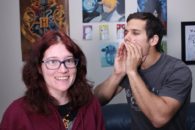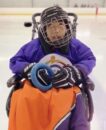I met my now-girlfriend, Phaedra, this summer at camp. We were both camp counsellors at Golden Lake Camp and I remember, one of the first things she asked me about — during one of our breaks — was what music did I like.
I showed her the albums I have saved on my phone. She was quite amused that I had only one 1975 album saved, “I Like It When You Sleep, for You Are So Beautiful Yet So Unaware of It.” The 1975 is one of her favourite bands so she showed me the rest of their music. I remember how happy and joyful she looked when we listened to music. She would shake her head repeatedly and her hair would eventually hit me on the face. We became close friends almost instantaneously.
Sometimes, at night, we would sneak out and talk for hours about anything. Our chats would start being casual but they would get really serious and I remember sometimes we weren’t able to finish the talks because her battery would die…
… I forgot to mention, Phaedra has a severe hearing loss. She has a cochlear implant and she depends on a battery to hear.

Design editor and reporter René Torres and his girlfriend posing in front of the Christmas tree in Rideau Centre.
The first times when her battery died, I was nervous. I didn’t know how to react or what to do. But as time went by, I learnt that we could still communicate without sounds. It is a great bonding experience.
But I still have a lot to learn about supporting and loving a person with a hearing impairment. I wondered: how are other Ottawa students in relationships similar to mine doing? I’d like to learn from them. And, importantly, I’d like to learn how we all can learn to better support the members of our community with hearing problems.
Amy Knox, a psychology student at Carleton University, has struggled all her life with hearing problems on her right ear. It started when she was baby and continues still today. The doctors do not know what affects her hearing. When she was in grade school, her parents needed to go every day, take her out of class and apply some treatment that the doctors thought would help but it didn’t.
“They couldn’t figure out why my hearing was bad because I don’t have any nerve damage and the doctor thought I had a bone disease,” says Knox. “They thought my bones weren’t connected so I went to see a surgeon. In May I had surgery for that. I saw the guy in September for my hearing test. Four months after and it’s not better. My hearing of speaking tones is worse now.”
Because they can’t find the source of the problem, she’s now being counselled to get hearing aids.
But for someone who has an idea of what the world looks like without any kind of hearing aids, the thought of having one in their ears is scary. Mostly because it is stigmatized. People fear the unknown and discriminate people with any kind of hearing aid. There is a huge lack of information about hearing impediment and its treatments not only in Canada but in the entire world.
To fight this, the Carleton Sign Society tries to help. The group is meant for students who are interested, learning or fluent in ASL to socialize as well as to give people a better understanding of hearing impediments.
At school, some students face problems with the acoustics in the classrooms or teachers who do not know or understand how they can help students with hearing challenges do better at school. But there are also problems those people face in the workforce.
“Some doctors say that my hearing loss would make it hard for her on the field because ‘psychologists need to listen well so they can help the people’ and with my hearing problems I might struggle,” she says. “But I don’t know.”
Moments like these make it hard for the person to keep motivated and work towards their goals. This is when family and friends come into play. When they suggested Knox get hearing aids, her mom told her she was going to see if her insurance could cover it. “Mom was like: ‘Whatever you have to do. Don’t worry about money. I’ll help you pay for it,’” says Knox. “Dad lives in another province but he is super nice about everything.”
But Knox has Ryan Schmitt, her boyfriend, who is also a psychology and history student at Carleton, who is there for her.
Though Knox’s hearing problems, they always love to share laughs and smiles with almost everyone they meet. One of the most common stories Ryan mentions is about how confusing it gets to talk to Amy.
“We walk through the canal every day to go to school,” he says. “One day I was talking to Amy and she was even nodding and saying ‘mm’ to what I was saying. But, like, five minutes into the conversation she stops and says that she wasn’t listening.”
Still, Schmitt went to most of Knox’s appointments before her surgery in May and was there for her after the surgery.
In my personal experience, I’ve always tried to be there for Phaedra. I learnt to speak loudly and try to be on her right side where she has her implant. And whenever she is not wearing her battery, I try to be empathic and pause my music, stop speaking and put myself in her shoes, which is not bad. It is just a different perspective on life, where you have to be more aware and mostly trust your other senses.
One thing that everyone, not only the hearing-impaired community, implements in their lives is ASL. Neither Phaedra nor I speak it, but Knox and Ryan do. Not because Knox needs it, they learned it just in case. So far, however, they speak it because of the richness of speaking another language.
“I started taking it as a joke because I would say that my hearing was already bad and I would go deaf someday so I might just start learning ASL now,” Knox says. Instead, she found out she really likes it. “It really works because a deaf person came into work and he had his own interpreter so I could kind of interact with him and it was cool.”
The idea of not being able to listen sounds tough but in reality, it is not that bad. Also, technology is helping reduce the challenges people face when it comes to hearing loss. Students do face problems but with effort and support, they can make everything possible.



